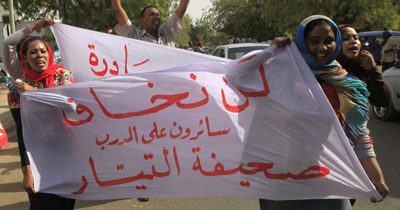Sudanese authorities have a long history of closing newspapers and silencing journalists. But the government security agents who carry out official censorship have launched a new strategy this year that focuses on economic impoverishment–leaving newspapers more vulnerable than ever.
Agents of the National Intelligence and Security Services (NISS) now raid printing presses and confiscate newspapers on grounds that publications are covering topics barred by the NISS. The agency’s red lines are numerous, changeable, and ungoverned by law or judicial order. The NISS demands, for example, that newspapers abstain from covering the International Criminal Court, government corruption, human rights violations, Darfur, the war in South Kordofan and Blue Nile, armed movements, and many other subjects.
In the past, the NISS would censor publications in advance by dispatching agents to newsrooms. Officers would read the newspaper in full and order articles be taken out and replaced. In many cases, they would reject the replacement articles too, and halt the printing of the newspaper entirely. The officers would oblige editors to sign a pledge not to publish the censored articles elsewhere, notably online.
The new goal: Censor newspapers and force them to incur heavy financial losses. Agents, for example, have confiscated copies of the newspaper Al-Maidan on several occasions, among them February 21, and March 13, 15, 17 and 18. The newspaper said it lost thousands in revenue each time the printed copies were confiscated. Al-Maidan Editor-in-Chief Madiha Abdullah said the newspaper pays for printing in advance with the expectation it will cover the expense through sales. But copies on these five dates never made it to newsstands and were instead hoarded at security offices.
On February 20, copies of Al-Ahdath and Al-Tayar were confiscated at their respective printing presses. Both publications incurred significant losses. On March 27 and 29, the NISS confiscated Al-Jarida copies at the printing press after the publication refused to suspend journalist Zuhair al-Siraj. In a statement, the management of the newspaper said it had received a phone call from the NISS conveying the agency’s wishes regarding al-Siraj, who had criticized the Sudanese government in an article. When Al-Jarida management requested the NISS put its wishes in writing, the agency refused.
The agency has taken direct action as well. On February 22, the NISS director general suspended publication of Al-Tayar indefinitely. A writer from Al-Tayar was arrested the same day. The newspaper resumed publication only after it had accepted NISS conditions.
It’s worth noting that the president of the National Council for Press and Publications, the government body officially charged with overseeing newspapers, said in an interview with a local news outlet that the NISS exercises full control over the press. Even his agency is powerless due to NISS encroachment.
This all comes at a time when government officials feel free to accuse journalists of treason and espionage, with pro-regime newspapers amplifying the accusations. With such attacks taking place and with security agents controlling what can be published, independent journalism in Sudan remains in great peril.
